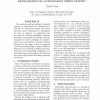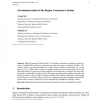287 search results - page 41 / 58 » Mental Models in Spatial Reasoning |
GIS
2009
ACM
14 years 9 months ago
2009
ACM
A parallel version of the plane sweep algorithm targeted towards the small number of processing cores available on commonly available multi-core systems is presented. Experimental...
MVA
1994
13 years 10 months ago
1994
The visual perceptional ability of computer systems to understand the environment is desirable in engineering design and manufacturing where automation is anticipated. I n order t...
LICS
1996
IEEE
14 years 22 days ago
1996
IEEE
We present a formal model for concurrent systems. The model represents synchronous and asynchronous components in a uniform framework that supports compositional (assume-guarantee)...
ICRA
2010
IEEE
13 years 7 months ago
2010
IEEE
Multi-robot systems researchers have been investigating adaptive coordination methods for improving spatial coordination in teams. Such methods adapt the coordination method to th...
FUIN
2006
13 years 8 months ago
2006
Abstract. Region Connection Calculus (RCC) is one primary formalism of qualitative spatial reasoning. Standard RCC models are continuous ones where each region is infinitely divisi...


